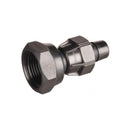Description
Hansen Reducing Female Straight Coupling
Used for connecting low density Polythrene Pipe (LDPE) & Enduroflex to male threads. Can also be used to connect flexible pipe and hose.
| Fitting | Code | Metric | Imperial |
| 20-15mm Female Straight Coupling | HRFS2015 | 20m x 15mm | 3/4" x 1/2" |
| 25-20mm Female Straight Coupling | HRFS2520 | 25mm x 20mm | 1" x 3/4" |
| 32-25mm Female Straight Coupling | HRFS3225 | 32mm x 25mm | 1 1/4" x 1" |
| 40-32mm Female Straight Coupling | HRFS4032 | 40mm x 32mm | 1 1/2" x 1 1/4" |
| 50-42mm Female Straight Coupling | HRFS5040 | 50mm x 40mm | 2" x 1 1/2" |
Features
* Max Pressure at 20° Celsius = 16 Bar
* Manufactured from a Raw Material Approved For Use With Potable Water.
* Manufactured from High Quality Glass Fibre Reinforced Nylon.
* Weather, Termite, Fungi & Bacteria Resistant.
* Common Applications Include Horticultural, Agricultural, Irrigation & Plumbing.
* Fire Rating UL94HB and UV Stabilised.
Low Density Fittings
Used for: Low-Density Pipe
* SKU: 300-(ID Pipe Size)-(Coil Size)
* e.g 300-25-100 (25mm = ID Size, 100 = Coil Length)


Tips:
- Low-density pipe is referred to by its inside diameter (ID)
- The low-density fitting barbs go inside the pipe
- The LD screw nut tightens overtop of the LD pipe.
- Tighten with spanner or pipe grips
- Before installing the fitting onto the pipe, always ensure the nut is wound back to the centre (body) of the fitting as far as possible.
- In cold conditions you may need to heat the pipe or run a large phillips screwdriver around the inside of the pipe to open up the pipe end, or a combination of the two for insertion onto the fitting hose tail. Some ways to soften the pipe are;
- Dip the pipe into hot water in a thermos flask.
- A gas torch, the larger the pipe bore the larger the flame required, but be careful not to over heat the pipe.
- A vehicle exhaust but again be careful not to damage the pipe.
When the nut is tight you should see no more than 4 to 5 threads at the back of the nut, if anymore again you have not forced the pipe onto the fitting far enough and need to back the nut off and go back to step 3

1 - Cut the pipe with pipe cutters, a knife or saw. Ensure a square cut of pipe ends. Clean burs off pipe. When making a repair in a burst pipe make sure the length of the cut away matches the length of the replacement fitting between the screwed on nuts.

2 - Ensure the nut is fully wound back onto the body of the fitting. Push the pipe onto the fitting and as far as possible into the nut.

3 - Wind the nut onto the pipe a few turns. Tighten with spanner or pipe grips.

Payment & Security
Your payment information is processed securely. We do not store credit card details nor have access to your credit card information.


